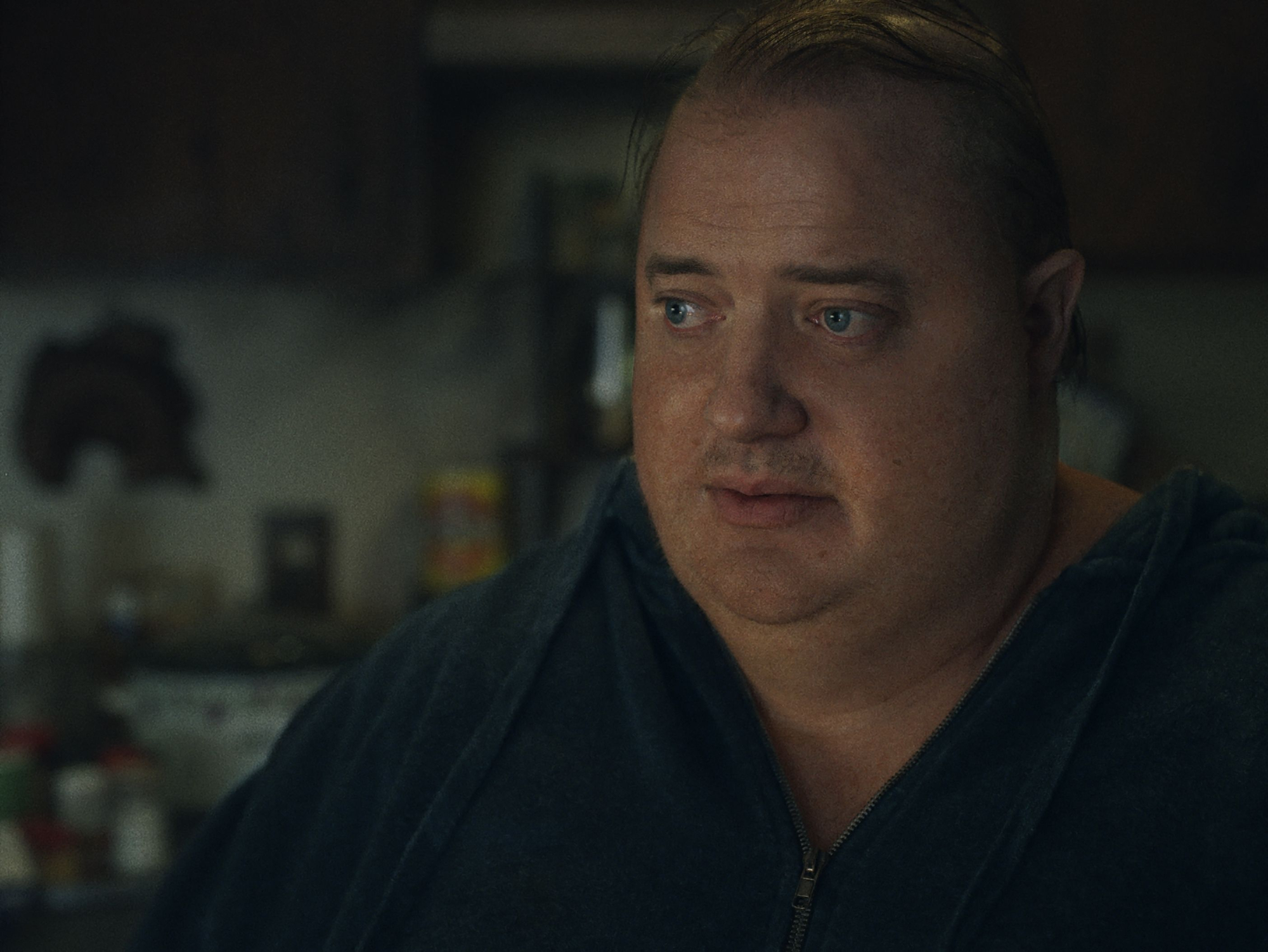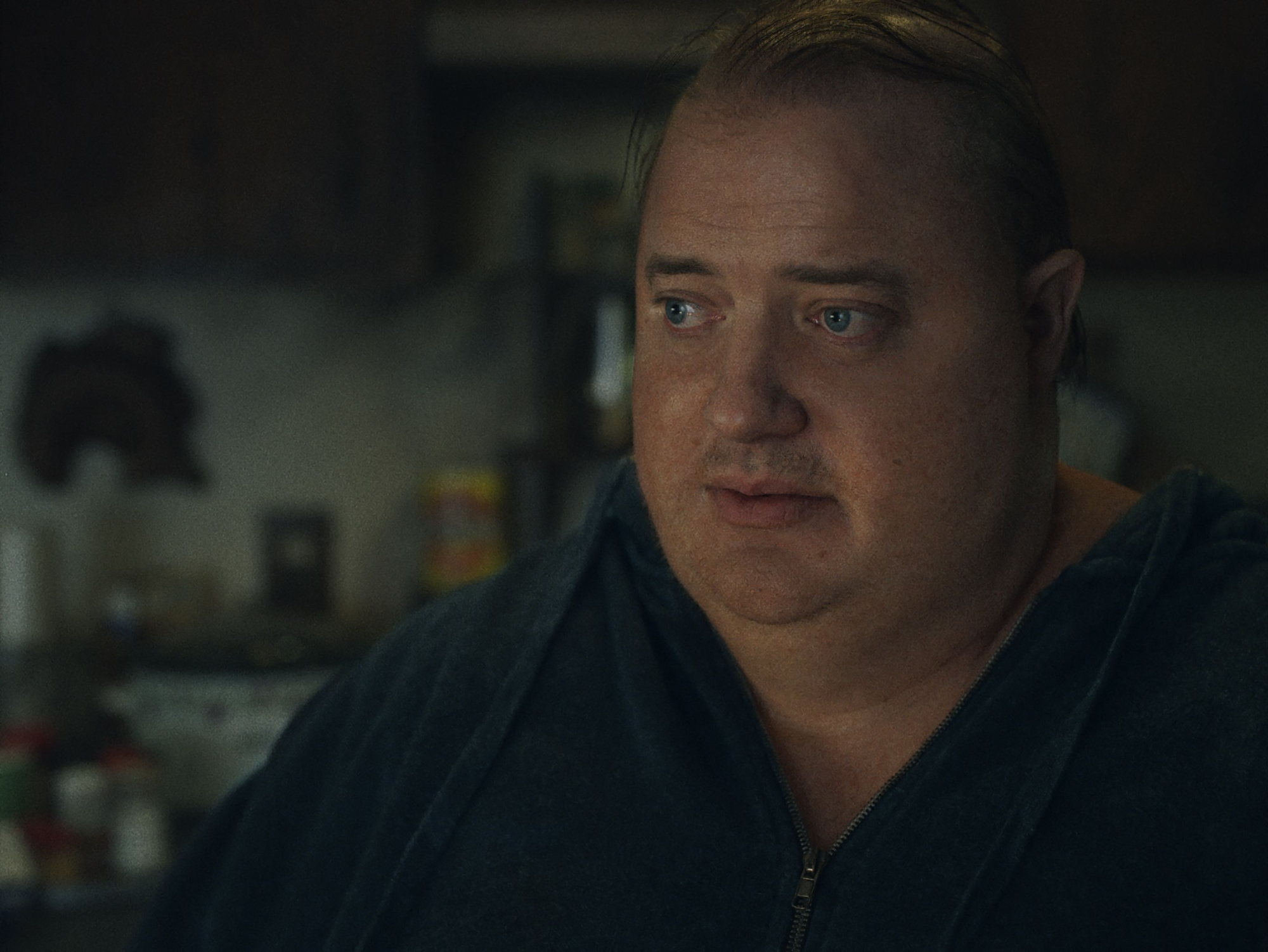
‘The Whale’ Movie Review: Darren Aronofsky’s Weepy Drama Rings Insincere
Director Darren Aronofsky knows a thing or two about dark dramatic storytelling and how to build characterizations that envelope the viewer. Unfortunately, The Whale falls far from his previous significant works, such as Mother! and Black Swan. Brendan Fraser, Hong Chau, and Sadie Sink all pour their hearts into this feature, but Samuel D. Hunter’s own source material and the execution of adapting to a different medium are the film’s greatest weakness.

‘The Whale’ follows a father trying to reconnect with his daughter

Charlie (Fraser) works as a remote English teacher, but he hides behind the screen of his computer, refusing to allow his students to see what he really looks like. He’s a 600-pound man whose depression led to his reclusive state after his lover died, now only seeing his best friend and nurse, Liz (Chau).
He accepts that he’s nearing the end of his life and is making peace with that. Therefore, he wants to reconnect with his teenage daughter, Ellie (Sink), who he abandoned along with his wife, Mary (Samantha Morton), for another man. However, the situation only becomes increasingly complicated as they continue to connect.
A story of grief, love, and the search for meaning
The online English class that Charlie teaches in The Whale sets the tone of a self-conscious man who has shut himself off from the world. He avoids human contact at all costs, pushing society’s cruelties and judgments away. Charlie perceives Ellie’s arrival as a gift, even though she brings much of this ferocity along with her. Despite the fact that his entire life became reduced to the confines of his small apartment, he faces his own horrors that make actions such as watching pornography or trying to get to another room potentially life-threatening.
Charlie searches for the meanings in all things, desperately yearning to find life in those around him, including the essays written by his students. Additionally, he searches for it in his interactions with Liz, Ellie, and a young religious boy named Thomas (Ty Simpkins) who believes that he can save him. In the process, all those surrounding Charlie also try to discover their own meanings in life, which ultimately all lead back to the reclusive man, for better or worse.
Hunter’s screenplay weaves a running theme of helpfulness vs. helplessness throughout the story. All of these characters are trying to help one another in various ways, some psychologically and others physically. However, The Whale makes the audience question when aid can actually create more harm than good. Nevertheless, it speaks to the human condition as it relates to altruism, or the lack thereof. This small cast of characters bring their own biases, imprinting them on one another’s personal dilemmas that run deeper than any of them care to speak of.
The Whale emphasizes the importance of the written word. Charlie repeats an essay from the past that he memorized word-for-word, providing him a sense of peace in his greatest moments of distress. Thomas tries to implement similar notions of tranquility through the Bible. Religion and faith have big parts to play, but not always in the same stroke. Hunter ponders whether these tools have the power to save a person, or at the very least, calm their soul.
‘The Whale’s overdramatization borders on parody

Aronofsky provides a further bleakness to The Whale. It’s based on Hunter’s 2012 play of the same name, and it very much feels that way in the adaptation to the film medium. Matthew Libatique’s cinematography introduces a stark claustrophobia in a picture stripped of its color, leaving the performances to bring the liveliness to the screen. Fraser gives his all as Charlie, but Chau steals the show as Liz. Unfortunately, that’s where the positive remarks end.
The Whale serves a heavy-handed platter with using a large bucket of fried chicken as the ever so obvious and toxic depiction of weight gain. The theme of consumption plays plays on both ends of the spectrum that feels both ingenuine and manipulative to a point of insult. Rob Simonsen’s score crescendos over images of Charlie consuming in scenes that disturb, but it ultimately overshadows the character.
Charlie’s story is filled with cruelty and despair, but he has no depth beyond his sorrow. Despite some stories about his happiness with his late partner, there isn’t any semblance of any kernels of joy, even in the past. Charlie continues to try and see the best in people, although Ellie lost all faith in humanity after the abandonment of her father. Nevertheless, Aronofsky doesn’t leave anything for the viewer to latch onto to make these characters feel fully-developed, asking us to simply take him at his word.
The Whale seeks to find some sort of grander truth, but it doesn’t interrogate its own preachy messaging. Hunter reaches for strange attempts at humor that don’t pan out, while some of the film’s most significant emotional moments sink due to dramatization to the point of parody.
The material short-changes the audience with a distorted onslaught of excessive cruelty with no pay-off. It reaches for the low-hanging fruit, failing to make something compelling out of the ideas that it presents while carelessly yanking on the heartstrings as hard as it can. But, it lacks the care to justify the emotional swings it takes. The Whale is in dire need of sincerity, expecting to draw empathy when it can’t even find it for its own lead character.
The Whale comes to theaters on Dec. 9.
How to get help: In the U.S. and Canada, text the Crisis Text Line at 741741 to reach a crisis counselor for support.


